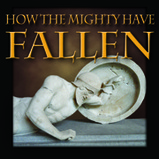 “Those who have been once intoxicated with power, and have derived any kind of emolument from it, never can willingly abandon it.” - Edmund Burke Saul was obsessed with establishing his greatness. But the price of his ambition was the abuse of the people he was called to serve. He wanted a dynasty, an empire that would stand for ages to come. He wanted a name that all the earth would adore and revere. But to do this, he exploited his people. He forbade them from eating, resting, or tending to their own needs until his victory was sure. In fact, he pronounced a curse upon any who refused to cooperate. It mattered not how distressed, fatigued, or hungry they were. All that mattered was his ambition. Driven by a perverted vision of greatness, Saul believed that Israel existed to serve him rather than him for it. Instead of esteeming the people as a trust God had given him to shepherd and protect, he saw them as things to use to fulfill his own lust for success. Sadly, the same self-serving spirit that drove King Saul is a force growing more common in the body of Christ: Christian leaders using their office, not to glorify God or edify His people, but to promote themselves. At first glance it appears their cause is noble. They seem to be serving people and advancing the Kingdom of God; but closer examination reveals something different. There is a subtle tendency to manipulate others, to control and use them like objects to advance the leader’s ambition. Corruption is the abuse of public office or position for private gain. It is when something good turns bad. It is when good leaders, who begin with noble intentions, become enticed and corrupted by selfish opportunities. They cease to use their authority to serve the public good and, instead, use their position to better themselves, solicit favors, amass wealth, promote friends and family, and leverage power to themselves. This is what happened to Saul. He used his authority as a means to achieve his own ambitions. There is no greater protection a leader has against corruption than the heart of a servant. This is one reason why Jesus made it a prerequisite for leaders in the Kingdom of God. He knew that in a very short time, after His ascension and the outpouring of the Holy Spirit, thousands would be saved and the disciples would be given charge over large sums of money. Acts 4 tells how “…all who were possessors of lands or houses sold them, and brought the proceeds of the things that were sold, and laid them at the apostles' feet; and they distributed to each as anyone had need” (Acts 4:34-35). Clearly, because the apostles saw themselves as servants of the people, they were able to distribute these assets without acting like Judas who was a “‘thief’…and used to take what was put in the money bag for his own use” (John 12:6). Leadership is a trust given to us by those we lead. Never should it be used for one’s own benefit or personal advancement. That would be an abuse of one’s authority. Every decision, action, and reaction should be meant for the advancement and betterment of those we serve and the organization we represent. If one aspires to leadership out of a desire for power, recognition, or control, he or she is aspiring for the wrong reason. Our ministry will be polluted with impure motives and defiled by worldly ambition. What’s worse is it will be void of God’s blessing and will actually draw down His curse. James 4:6 says, “God resists the proud.” Proverbs 16:18 tell us that “Pride goes before destruction, and a haughty spirit before a fall.” Self promotion provokes God to move against us and pull our ministry down. Humility, on the other hand, invokes God’s blessing and rich provision. 4/12/2015 10:04:28 pm
Each choice, activity, and response ought to be implied for the headway and advancement of those we serve and the association we speak to. 11/18/2015 08:00:45 pm
Lessons have been taught about the abusing of the power and authory. The availability of the goodness and kindness is very important and significant in different and variant terms. The skills and abilities are applied for the right and accurate sites and plans. 6/19/2017 04:20:04 pm
What's up, nice webpage you have got here. Comments are closed.
|
Archives
February 2023
Categories
All
It was concerning King Saul that David said, “How the mighty have fallen, and the weapons of war perished.” His was a life that began with great promise and celebration, but ended in miserable failure and humiliation. His life is an example of how the mightiest of leaders fail.
Why do great men and women fall? How do leaders, quick to ascend with such promise of unparalleled success, find themselves awash in disastrous failure and disgrace? More importantly, can the path toward one’s downfall be discerned before it’s too late and be avoided? It is the premise of my newest book, How The Mighty Have Fallen that such a decline can be detected and reversed. The life and leadership career of King Saul, Israel's first king, provides us with a treasury of examples of "what not to do." The below blog post is the first in series of excerpts from the book to examine and avoid Saul's mistakes and find a successful path through leadership. READ AN EXCERPT |
all content on this website is ©GreggTJohnson

 RSS Feed
RSS Feed